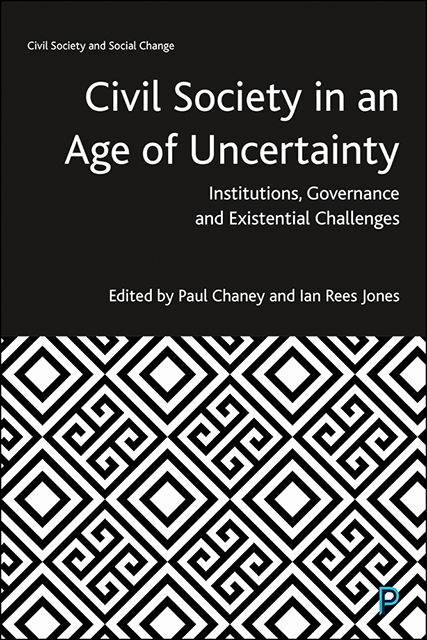Book contents
- Frontmatter
- Contents
- List of tables and figures
- Notes on contributors
- Acknowledgements
- 1 Introduction: Locating civil society
- 2 Existential challenges
- 3 Civil society and the governance of city region economic development
- 4 Civil society, pandemic and the crisis of welfare: exploring mixed economy models of welfare in domiciliary adult social care in a devolved UK
- 5 The contemporary threat to minority languages and cultures: civil society, young people and Celtic language use in Scotland and Wales
- 6 Digital threat or opportunity? Local civil society in an age of global inter-connectivity
- 7 Democratic decline? Civil society and trust in government
- 8 Xenophobia, hostility and austerity: European migrants and civil society in Wales
- 9 Meeting the challenge? Prospects and perils for civil society in the twenty-first century
- Index
7 - Democratic decline? Civil society and trust in government
Published online by Cambridge University Press: 16 June 2023
- Frontmatter
- Contents
- List of tables and figures
- Notes on contributors
- Acknowledgements
- 1 Introduction: Locating civil society
- 2 Existential challenges
- 3 Civil society and the governance of city region economic development
- 4 Civil society, pandemic and the crisis of welfare: exploring mixed economy models of welfare in domiciliary adult social care in a devolved UK
- 5 The contemporary threat to minority languages and cultures: civil society, young people and Celtic language use in Scotland and Wales
- 6 Digital threat or opportunity? Local civil society in an age of global inter-connectivity
- 7 Democratic decline? Civil society and trust in government
- 8 Xenophobia, hostility and austerity: European migrants and civil society in Wales
- 9 Meeting the challenge? Prospects and perils for civil society in the twenty-first century
- Index
Summary
Trust (and its corollary mistrust) lies at the heart of contemporary debates regarding governance and democracy. There is an extensive literature focused on conceptualising trust, and more specifically political trust, and exploring the potential consequences of the perceived decline or erosion in the latter for democracy (Cook 2001; Rothstein and Uslaner 2005; Torcal and Montero 2006; van Deth et al 2007). Problems of democratic deficit, of the misfit between politics and policy, of political corruption apparently undermine trust in politicians and underpin the emergence in most EU polities of forms of national Populist Party responses (Schmidt 2006). There is a strong and growing demand for more diverse and effective forms of citizen and civil society engagement to increase levels of trust and engage an increasingly diverse, busy and complex urban population; hence the linkage between trust and concepts like co-production and co-creation (Fledderus 2015).
The chapter addresses the related themes of trust and mistrust, coproduction or co-creation and democratic confidence. It draws on comparative analysis drawn from the UK, France and Germany as part of the WISERD ‘Building Trust? Institutions and interactions of multi-level governance in the UK, Germany and France’ project. The chapter is divided into three sections. The first section provides a brief overview of debates around the conceptualisation of trust and, in particular, the forms of ‘political trust’ that are frequently utilised in debates around the crisis of democracy. The second section analyses contemporary arguments around the decline of trust in the three countries included in the project. This analysis draws on a range of data sources, including the 2016 YouGov survey carried out as part of the project. The final section examines the shape and role of civil society actors within the three different national contexts in relation to wider debates around trust in government.
The existential threat to democracy and democratic institutions presented by the decline in political trust has become a well-worn path ventured down by politicians, journalists and academics in recent decades (Lenard 2005; van der Meer 2017).
- Type
- Chapter
- Information
- Civil Society in an Age of UncertaintyInstitutions, Governance and Existential Challenges, pp. 133 - 162Publisher: Bristol University PressPrint publication year: 2022

